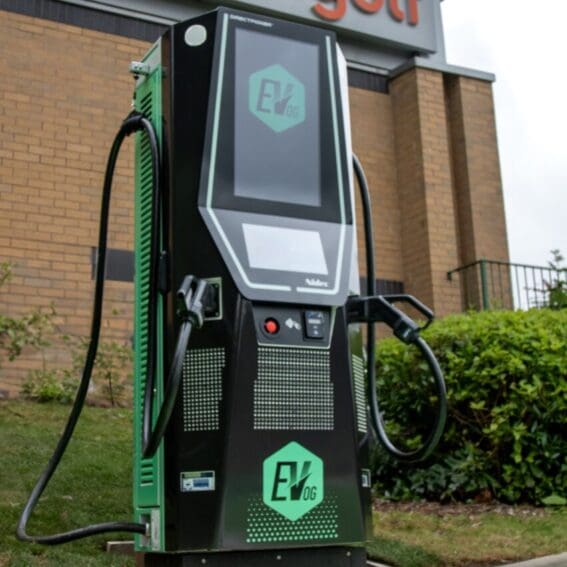
Why Your Business Should Lead the Charge with EV Infrastructure
The shift to electric vehicles isn’t just happening, it’s accelerating at breakneck speed. For businesses across the UK, this presents a unique opportunity to get ahead of the curve by investing in electric vehicle charging infrastructure.
Beyond the obvious environmental benefits, there are compelling business reasons to make this investment now.
Smart businesses are already recognising that EV charging isn’t just about keeping up with trends. It’s about positioning themselves as forward-thinking employers, attracting eco-conscious customers, and building sustainable operations that will thrive in the coming decades.
The Business Case for EV Charging Investment
Attracting and Retaining Top Talent
Today’s workforce increasingly values employers who demonstrate genuine commitment to sustainability. By providing workplace charging facilities, you’re offering a tangible benefit that saves employees money and reduces their carbon footprint. This perk can be particularly attractive to younger professionals who are more likely to drive electric vehicles.
Employees with EVs face a common challenge: finding reliable charging points during their working hours. By solving this problem, you’re not just offering convenience, you’re showing that you understand and support their lifestyle choices.
Enhancing Customer Experience
For retail businesses, restaurants, and service providers, an electric vehicle charging hub can transform how customers interact with your brand. EV drivers often plan their journeys around charging stops, and they typically spend 20-45 minutes at each location whilst their vehicle charges.
This extended dwell time creates opportunities for increased sales and deeper customer engagement. Coffee shops, shopping centres, and leisure facilities particularly benefit from this captive audience who have time to browse, purchase, and enjoy your offerings.
Future-Proofing Your Operations
The UK government’s ban on new petrol and diesel car sales from 2030 means electric vehicles will soon dominate our roads. Businesses that invest in charging infrastructure now will be ready for this transition, whilst those that wait may find themselves scrambling to catch up.
Early adoption also means you can secure the best locations for charging points and establish your business as a destination for EV drivers before your competitors do.
Maximising Sustainability Impact
Integrating Renewable Energy Connections
The environmental benefits of your EV charging investment multiply when you incorporate renewable energy connections. Solar panels, wind power, or grid-supplied renewable energy can power your charging stations, creating a truly sustainable transport solution.
This approach allows you to offer genuinely green charging to your customers and employees. Many EV drivers are environmentally motivated, so they’ll appreciate knowing their vehicle is being powered by clean energy sources.
Renewable energy also provides long-term cost benefits. As renewable energy becomes increasingly cost-competitive with fossil fuels, your charging operations become more economical over time.
Building Your Green Credentials
Corporate sustainability reporting is becoming mandatory for many businesses, and demonstrating real environmental action is increasingly important for brand reputation. Installing EV charging infrastructure provides concrete evidence of your commitment to reducing carbon emissions.
This investment can contribute to various sustainability frameworks and certifications, helping you meet environmental targets and appeal to eco-conscious consumers and partners.
Practical Benefits for Business Operations
Revenue Generation Opportunities
EV charging doesn’t have to be a cost centre, it can generate revenue. You can charge fees for using your charging points, potentially creating a new income stream. Even if you offer free charging to employees or customers, the indirect benefits often outweigh the electricity costs.
Some businesses partner with charging networks to install and operate stations on their premises, sharing revenue whilst minimising upfront investment.
Improved Property Value
Commercial properties with EV charging options are becoming more attractive to tenants and buyers. As electric vehicles become mainstream, charging facilities will transition from nice-to-have amenities to essential infrastructure.
This investment can enhance your property’s long-term value and marketability, whether you’re planning to sell, lease, or simply want to maintain competitive premises.
Operational Efficiency for Fleet Vehicles
If your business operates a vehicle fleet, transitioning to electric vehicles with on-site charging can significantly reduce operational costs. Electric vehicles have lower maintenance requirements and fuel costs compared to traditional vehicles.
On-site charging eliminates the need for drivers to find public charging points, saving time and improving efficiency. You can also schedule charging during off-peak hours to minimise electricity costs.
Getting Started with Your EV Investment
Planning Your Electric Vehicle Charging Hub
Consider your specific needs and usage patterns when planning your charging infrastructure. Assess how many charging points you’ll need, what charging speeds are appropriate, and where to locate them for maximum convenience and safety.
Think about future expansion too. Installing the electrical infrastructure to support additional charging points later can be more cost-effective than retrofitting.
Choosing the Right Technology
Different charging technologies suit different use cases. Rapid chargers work well for customer-facing locations where quick top-ups are valuable. Slower chargers may be sufficient for employee parking areas where vehicles sit for extended periods.
Consider smart charging systems that can manage multiple vehicles efficiently and take advantage of variable electricity pricing.
Taking the Next Step Towards Sustainable Business
Investing in EV charging infrastructure positions your business at the forefront of the sustainable transport revolution. The benefits extend far beyond environmental impact, offering opportunities to enhance customer experience, attract talent, and create new revenue streams.
The transition to electric vehicles is inevitable, and businesses that embrace this change early will reap the greatest rewards.





